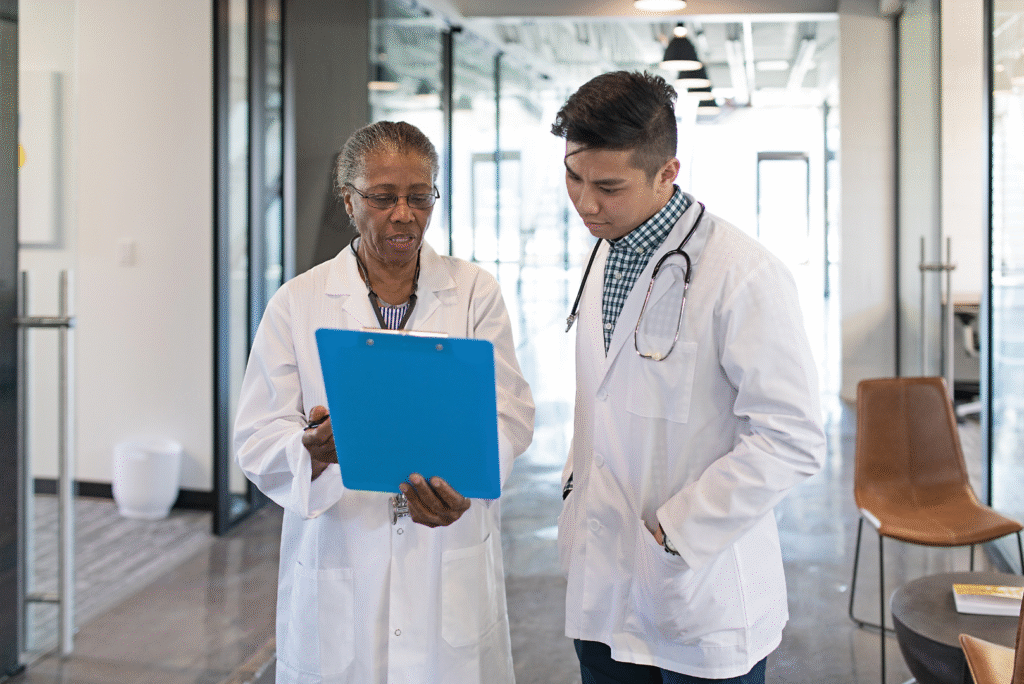Pediatric primary care
Mental Health Care for Under- or Uninsured Pediatric Patients
“Evaluating and treating mental health problems in under- or uninsured pediatric patients often presents more challenges, but it is even more rewarding when you are able to provide life-changing mental health care,” explains Natalie Robiou, MD, a pediatric primary care provider at a Federally Qualified Health Center (FQHC) in Philadelphia, PA. The number of pediatric…
Read MoreFrom Screening Tools to Systems Change: Tips for Putting Your REACH Training Into Practice
When providers attend their first Patient-Centered Mental Health in Pediatric Primary Care (PPP) training with REACH, many leave feeling empowered and excited to implement their new knowledge. But having evidence-based tools is only the first step in supporting mental health for children and adolescents. We asked several PPP alumni—and one who is now a faculty…
Read MoreHow Clinicians Can Partner with Schools to Support Pediatric Patients
“Clinicians who are aware of and know how to direct parents to obtain services for children within the school system can make an enormous difference for patients and families,” explains Dr. Mark Wolraich, MD, a REACH faculty member and retired professor of pediatrics at the University of Oklahoma Health Sciences Center. The challenge for clinicians…
Read MoreSpotting OCD in Pediatric Patients
“Even among skilled clinicians, misconceptions about obsessive-compulsive disorder or OCD can delay diagnosis and treatment,” explains Carla E. Marin, Ph.D., a licensed psychologist and Assistant Professor at Yale School of Medicine. With common sayings like “we’re all a little OCD” and representations of OCD that center on germs and handwashing, getting a clear picture of…
Read MoreWhy Clinicians Should Consider Coding by Time for Mental Health Care
“Many primary care providers are still coding by medical decision-making for mental health care,” explains Eugene Hershorin, MD, a REACH faculty member and medical coding expert. “However, time-based coding is both easier and often results in higher coding levels and therefore higher payment rates, especially for pediatric patients who require ongoing care for mental health…
Read MoreWhen parents’ mental health affects children
“When we’re thinking about children’s mental health, we’re also thinking about the health of the family unit,” explains Alyx Holden, MD. “In order for children’s neurobiology to develop, they need the support and context of healthy caregivers.”
Read MoreSleep Smart: Back-to-School Edition
REACH faculty, Dr Kowatch, emphasizes that it’s essential for caregivers to recognize the challenges that can arise when transitioning from summer to a more structured school routine. “Parents have got to anticipate there may be an adjustment period for the first week or two.”
Read MoreSupporting mental health needs in rural areas
Rural healthcare providers can be overwhelmed—and understaffed with specialists. Discover how REACH inspired Elizabeth Wallis, M.D., to build a community to support her patients.
Read More8 Tips for Working with Mental Health Therapists
Many patients who have mental health conditions need talk therapy in addition to the treatment you provide as the pediatric primary care provider (PCP). If you practice in an area where therapists are available, we hope you have developed referral relationships, as you learned in your REACH training. You may also see patients who are already working with a therapist.
In either case, the communication between you and the therapist makes a huge difference in the quality of care the two of you provide.
To learn how PCPs and therapists can collaborate to improve the mental health of children and adolescents, we talked with clinical psychologist Kevin Stark, PhD, a founder of The REACH Institute’s CATIE program, and pediatrician Hilary Bowers, MD, director of behavioral and mental health services at Children’s Primary Care Medical Group, a large pediatric practice in San Diego and Riverside counties in California.
Read MoreCross-titrating psychiatric medications
If you struggle with titrating psychiatric medications for your pediatric patients, you are not alone. Even for some alumni of the REACH program Patient-Centered Mental Health in Pediatric Primary Care, lack of comfort with psychiatric medications can hamper effective treatment.
What does it take to dose and cross-titrate effectively? We asked two REACH faculty members: Peter S. Jensen, MD, REACH founder, and Amy Kryder, MD, education lead of the statewide REACH program in Virginia.
Read More




